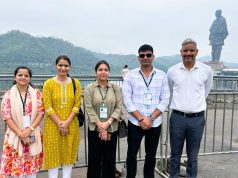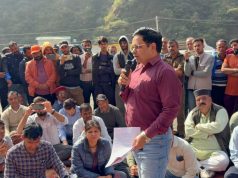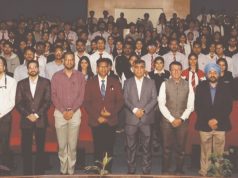‘Justice Keshav Chandra Memorial Lecture’ organised by ‘Karmabhoomi Foundation’
By Arun Pratap Singh
Dehradun, 2 Dec: Chief Justice of India, Justice DY Chandrachud was in Dehradun to deliver the first ‘Justice Keshav Chandra Dhulia Memorial Lecture’ at FRI Convocation Hall here today. He spoke on the topic, ‘Democracy, Debate and Dissent’ and stressed on key role of dissent in a democracy. He called upon all the institutions of democracy to side and support the underprivileged sections of society which may be a numerical or social minority so that all the citizens can feel free in a democracy. He also stressed upon participatory role of all sections of the society irrespective of their religion, caste, economic condition, gender or sexual orientation.  He added that a mere rule by majority can be established by many forms of government but the beauty of democracy is a sense of moral responsibility where all citizens can participate in a country and the consensus can be worked out in the process of decision making. He however conceded that in a democracy, the majority will have its way but added that the minority must have its say too.
He added that a mere rule by majority can be established by many forms of government but the beauty of democracy is a sense of moral responsibility where all citizens can participate in a country and the consensus can be worked out in the process of decision making. He however conceded that in a democracy, the majority will have its way but added that the minority must have its say too.
 He added that a mere rule by majority can be established by many forms of government but the beauty of democracy is a sense of moral responsibility where all citizens can participate in a country and the consensus can be worked out in the process of decision making. He however conceded that in a democracy, the majority will have its way but added that the minority must have its say too.
He added that a mere rule by majority can be established by many forms of government but the beauty of democracy is a sense of moral responsibility where all citizens can participate in a country and the consensus can be worked out in the process of decision making. He however conceded that in a democracy, the majority will have its way but added that the minority must have its say too.Justice Chandrachud began his speech by first addressing the audience and in particular the young audience in Hindi for a while. He admitted that English is a major deterrent factor in way of progress of a large number of youth. However, the higher courts and the Supreme Court deliver judgements in English. He added that there is a record of 36,000 judgements of the Supreme Court, all delivered in English.  However, the arguments in district and lower courts are generally not in English. Due to lack of adequate understanding of English language, the common people hardly ever understand what is transpiring in the courts. Chandrachud added that after taking over as the Chief Justice of India (CJI), he took a major initiative in getting the judgements translated in the scheduled languages of the country and so far, 20,000 judgements have been not only translated in Hindi but also verified. They are being made available to the districts and the young lawyers should make optimum use of these.
However, the arguments in district and lower courts are generally not in English. Due to lack of adequate understanding of English language, the common people hardly ever understand what is transpiring in the courts. Chandrachud added that after taking over as the Chief Justice of India (CJI), he took a major initiative in getting the judgements translated in the scheduled languages of the country and so far, 20,000 judgements have been not only translated in Hindi but also verified. They are being made available to the districts and the young lawyers should make optimum use of these.
 However, the arguments in district and lower courts are generally not in English. Due to lack of adequate understanding of English language, the common people hardly ever understand what is transpiring in the courts. Chandrachud added that after taking over as the Chief Justice of India (CJI), he took a major initiative in getting the judgements translated in the scheduled languages of the country and so far, 20,000 judgements have been not only translated in Hindi but also verified. They are being made available to the districts and the young lawyers should make optimum use of these.
However, the arguments in district and lower courts are generally not in English. Due to lack of adequate understanding of English language, the common people hardly ever understand what is transpiring in the courts. Chandrachud added that after taking over as the Chief Justice of India (CJI), he took a major initiative in getting the judgements translated in the scheduled languages of the country and so far, 20,000 judgements have been not only translated in Hindi but also verified. They are being made available to the districts and the young lawyers should make optimum use of these. He also mentioned the recent incident of rescue of 41 workers trapped in Silkyara in Uttarakhand and said that he wished to compliment everyone including the rescue workers, the engineers, the administration for the successful rescue of the workers. He also praised the resilience and endurance of the trapped workers and stressed that this rescue operation is indication of the fact that in times of crisis, everyone concerned comes together as one and tries to resolve the crisis. It also indicates that in a new India, and in a country of 1.4 billion, each and every life is considered valuable.
He also mentioned the recent incident of rescue of 41 workers trapped in Silkyara in Uttarakhand and said that he wished to compliment everyone including the rescue workers, the engineers, the administration for the successful rescue of the workers. He also praised the resilience and endurance of the trapped workers and stressed that this rescue operation is indication of the fact that in times of crisis, everyone concerned comes together as one and tries to resolve the crisis. It also indicates that in a new India, and in a country of 1.4 billion, each and every life is considered valuable. The CJI emphasised that deliberation strengthens democratic foundations and the vitality of dissent in a democracy. Engagement and debate must lie at the core of a participative democracy. He said that a democracy, in order to be more than a mere approximation of majoritarian preferences, needs to engage with all its stakeholders. The outcome may not reflect the preference of the minority section but this engagement will definitely remain etched as a historical fact-capable of being resurrected in the future.
The CJI emphasised that deliberation strengthens democratic foundations and the vitality of dissent in a democracy. Engagement and debate must lie at the core of a participative democracy. He said that a democracy, in order to be more than a mere approximation of majoritarian preferences, needs to engage with all its stakeholders. The outcome may not reflect the preference of the minority section but this engagement will definitely remain etched as a historical fact-capable of being resurrected in the future. Chandrachud also felt that in case a democracy cannot safeguard discourse around the needs of all its people, it then falls short of its promise. He also dwelt on electoral democracy, adding that merely because a body is elected does not ensure that it acts in the best interest of those who it governs. Democracy is messy, and imperfect but inherent in it are the postulates of justice, liberty, equality, and fraternity.
Chandrachud also felt that in case a democracy cannot safeguard discourse around the needs of all its people, it then falls short of its promise. He also dwelt on electoral democracy, adding that merely because a body is elected does not ensure that it acts in the best interest of those who it governs. Democracy is messy, and imperfect but inherent in it are the postulates of justice, liberty, equality, and fraternity. The CJI opined that a democracy is sustained by robust institutions that carry out democratic functions, and by procedural guarantees which prevent seepage of bias and unfairness in the process of decision making. The democracy requires constant dialogue between differing opinions and civil society organisations to fulfil the aspirations of the people. He said that deliberation, is the difference between a majoritarian decision that is foisted on an unwilling electorate and a decision that the people are willing to accept, engage with and hopefully alter one day. He also spoke on equality and said that equality in law may not result in equality in the society. However, expressing hope that unlike many other countries which also achieved their independence along with India, India could sustain its democracy because it remained an engaging form of democracy. Once, it was felt that the country was not ready for local self governance but with time, things alter.
The CJI opined that a democracy is sustained by robust institutions that carry out democratic functions, and by procedural guarantees which prevent seepage of bias and unfairness in the process of decision making. The democracy requires constant dialogue between differing opinions and civil society organisations to fulfil the aspirations of the people. He said that deliberation, is the difference between a majoritarian decision that is foisted on an unwilling electorate and a decision that the people are willing to accept, engage with and hopefully alter one day. He also spoke on equality and said that equality in law may not result in equality in the society. However, expressing hope that unlike many other countries which also achieved their independence along with India, India could sustain its democracy because it remained an engaging form of democracy. Once, it was felt that the country was not ready for local self governance but with time, things alter.  The 73rd amendment incorporated the local self governance as part of the constitution and Indian democracy. Similarly, initially women were considered unsuitable to serve in armed forces but presently they are commanding warships and flying fighter aircrafts.
The 73rd amendment incorporated the local self governance as part of the constitution and Indian democracy. Similarly, initially women were considered unsuitable to serve in armed forces but presently they are commanding warships and flying fighter aircrafts.However, the focus of the CJI’s speech remained on accepting dissent and on deliberations. He said that a deliberated outcome accords legitimacy to the institutions of governance. It is the difference between a defeated idea and a disenfranchised democratic participant. He said that while deliberation sustains a democracy, dissent nourishes it. He concluded with the hope that the young minds who participated in this event will be committed to the values of the constitution which cultivate a culture of democracy, debate, and dissent.
 The CJI also handed over the awards to the winners of Justice KC Dhulia memorial debate and essay competitions. Justice (Retd) UC Dhyani introduced the audience to the life of Late Justice Keshav Chandra Dhulia while Justice Sudhanshu Dhulia of Supreme Court introduced the audience to the professional achievements of Justice Chandrachud.
The CJI also handed over the awards to the winners of Justice KC Dhulia memorial debate and essay competitions. Justice (Retd) UC Dhyani introduced the audience to the life of Late Justice Keshav Chandra Dhulia while Justice Sudhanshu Dhulia of Supreme Court introduced the audience to the professional achievements of Justice Chandrachud.Film director Tigmanshu Dhulia proposed the vote on thanks.
Chairperson of Karmabhoomi Foundation Sumitra Dhulia was also present.
On this occasion, Acting Chief Justice of Uttarakhand High Court Justice Manoj Kumar Tiwari, several other judges and lawyers and Capt (Retd) Himanshu Dhulia were also present. The programme was organised by the Karmabhoomi Foundation established by Dhulia family.
Wing Commander (Retd) Anupama Joshi was the Master of Ceremonies.
Winners of Justice KC Dhulia Memorial Debate and Essay Competitions
By Our Staff ReporterDehradun, 2 Dec: Chief Justice of India, Justice DY Chandrachud today handed over cash prizes and the medals to the winners of Justice Keshav Chandra Dhulia Memorial Debate and Essay competitions. Justice Keshav Chandra Dhulia Memorial Debate competition was held at Modern Doon Library in Dehradun on 20 November. In all, 8 teams had participated in the debate. Uttaranchal University team comprising of Parth Narayan Singh and Satakshi Sharma of Law College in Uttarachal University were the winners while the UPES University team comprising of Mnoneet and Asveer were the runners up.The third prize was won by Kumaon University team comprising of Nishtha Joshi and Mushad. Satakshi Sharma of Uttaranchal University was declared the best speaker. Chief Justice of India, Justice DY Chandrachud gave away the prizes.
In the Justice Keshav Chandra Dhulia Memorial Essay Competition also held at Modern Doon Library in Dehradun on 20 November, Virendra Pratap Singh Rathod of UPES won the gold medal whileJeet Sinha also of UPES won the silver medal. The bronze medal was won by Akshat Goyal of Uttaranchal University. The winners were handed over cash prizes and the trophies today by Justice Chandrachud at a function held at FRI Campus today where the Chief Justice of India, delivered the first Justice Keshav Chandra Dhulia Memorial lecture.








